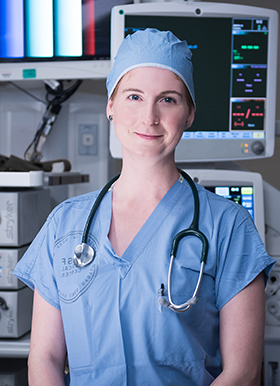One of the philosophies that we espouse in the Department of Anesthesiology is that if you train here at Washington University School of Medicine in St. Louis, you will acquire the foundational skills and knowledge to thrive anywhere. We believe that this applies to medical student training, doctoral (PhD) training, masters level training (e.g. Master of Science in Clinical Investigation, Master of Population Health Sciences), residency training, SRNA training, APP training, and fellowship training. So many people who have received their foundational education and training here at WashU have gone on to be scientific, educational, clinical, university, health system, and industry leaders all around the world.

With this background in mind, the Department would like to recognize Elizabeth Whitlock, MD, MSc, assistant professor of anesthesiology and perioperative care at the University of California San Francisco, and alumna of Washington University School of Medicine (MD) and its MSc in clinical investigation program (ICTS TL-1), on the publication of the highly impactful paper “Association of Coronary Artery Bypass Grafting vs Percutaneous Coronary Intervention With Memory Decline in Older Adults Undergoing Coronary Revascularization” in the Journal of the American Medical Association.
The study tackles one of the most controversial and consequential questions faced by surgical patients: does surgery under general anesthesia carry a cognitive cost. This concern has been emphasized for patients undergoing cardiac surgery, where prominent scientific journal and mainstream media have endorsed a narrative of a causal link between the surgery and poor neurocognitive outcomes, including dementia. Thus, many patients with coronary artery disease struggle with the question: should they choose coronary artery bypass surgery or percutaneous coronary intervention? The surgery might have a better long-term outcome in terms of the heart, but they might be reluctant to put their brain at risk.
Whitlock’s study and subsequent publication show that the long-term cognitive trajectory after coronary bypass surgery appears to be no different from the long-term cognitive trajectory after percutaneous coronary intervention. Cardiac surgery also did not appear to be associated with increased risk of dementia.
“This is a very important paper that provides great reassurance that compared with PCI, CABG has no apparent adverse effect on cognitive function during a prolonged follow-up period,” says Michael Avidan, MBBCh, FCA SA, head of the department of anesthesiology and Dr. Whitlock’s former TL1 mentor. “Dr. Whitlock has continued to build on her WashU academic foundation at UCSF, where she has received prestigious foundation and federal grants. She is well on her way to becoming an independent and highly accomplished physician scientist.”
A 2011 graduate of Washington University School of Medicine in St. Louis, Dr. Whitlock’s research centers on understanding cognitive change over time in older adults and potentially modifiable risk factors for adverse anesthesia and surgery related outcomes. The Department of Anesthesiology is especially proud of Dr. Whitlock and all of her impressive successes since training here.